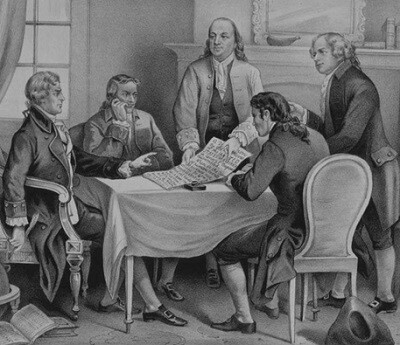History of the Junto

Credit: Benjamin-Franklin-History.org
Junto Member Essay Presentations
From Franklin’s autobiography,
The rules that I drew up required that every member, in his turn, should produce one or more queries on any point of Morals, Politics, or Natural Philosophy, to be discussed by the company; and once in three months produce and read an essay of his own writing, on any subject he pleased.
Qualify as a member
Any person to be qualified as a member was to stand up, lay his hand upon his chest, over his heart, and be asked the following questions, viz.
- Have you any particular disrespect to any present members? Answer. I have not.
- Do you sincerely declare that you love mankind in general, of what profession or religion soever? Answer. I do.
- Do you think any person ought to be harmed in his body, name, or goods, for mere speculative opinions, or his external way of worship? Answer. No.
- Do you love truth for truth’s sake, and will you endeavor impartially to find and receive it yourself, and communicate it to others? Answer. Yes.
From Wikipedia:
Questions used as a springboard for discussion and community action
- Have you met with anything in the author you last read, remarkable, or suitable to be communicated to the Junto? Particularly in history, morality, poetry, physics, travels, mechanic arts, or other parts of knowledge?
- What new story have you lately heard agreeable for telling in conversation?
- Has any citizen in your knowledge failed in his business lately, and what have you heard of the cause?
- Have you lately heard of any citizen’s thriving well, and by what means?
- Have you lately heard how any present rich man, here or elsewhere, got his estate?
- Do you know of any fellow citizen, who has lately done a worthy action, deserving praise, and imitation? Or who has committed an error proper for us to be warned against and avoid?
- What unhappy effects of intemperance have you lately observed or heard? Of imprudence? Of passion? Or of any other vice or folly?
- What happy effects of temperance? Of prudence? Of moderation? Or of any other virtue?
- Have you or any of your acquaintances been lately sick or wounded? If so, what remedies were used, and what were their effects?
- Who do you know that are shortly going [on] voyages or journeys, if one should have occasion to send by them?
- Do you think of anything at present, in which the Junto may be serviceable to mankind? To their country, to their friends, or to themselves?
- Hath any deserving stranger arrived in town since the last meeting, that you heard of? And what have you heard or observed of his character or merits? and whether think you, it lies in the power of the Junto to oblige him, or encourage him as he deserves?
- Do you know of any deserving young beginner lately set up, whom it lies in the power of the Junto any way to encourage?
- Have you lately observed any defect in the laws, of which it would be proper to move the legislature an amendment? Or do you know of any beneficial law that is wanting?
- Have you lately observed any encroachment on the just liberties of the people?
- Hath anybody attacked your reputation lately? And what can the Junto do towards securing it?
- Is there any man whose friendship you want, and which the Junto, or any of them, can procure for you?
- Have you lately heard any member’s character attacked, and how have you defended it?
- Hath any man injured you, from whom it is in the power of the Junto to procure redress?
- In what manner can the Junto, or any of them, assist you in any of your honorable designs?
- Have you any weighty affair in hand, in which you think the advice of the Junto may be of service?
- What benefits have you lately received from any man not present?
- Is there any difficulty in matters of opinion, of justice, and injustice, which you would gladly have discussed at this time?
- Do you see anything amiss in the present customs or proceedings of the Junto, which might be amended?
From Wikipedia: